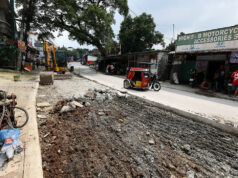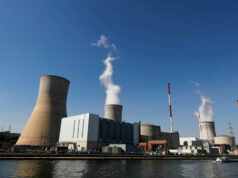US think tank expert flags planned joint development in disputed sea
By Ian Nicolas P. Cigaral Reporter
and Victor V. Saulon Sub-Editor
A JOINT development between the Philippines and China in the resource-rich South China Sea would be difficult to implement and may not conform with Manila’s legally won entitlements over the sea, an expert from a US think tank said.

Both countries, which have overlapping claims over the contested waters, are now open to the idea of joint energy ventures, with China’s foreign ministry recently saying that such cooperation will not “impair” the “final delimitation of boundary.”
But according to Gregory B. Poling, director of the Asia Maritime Transparency Initiative (AMTI) of Washington’s Center for Strategic and International Studies, working out such an agreement will be difficult considering its complexity.
He explained that under such arrangement, Manila and Beijing would “set aside” questions of sovereign rights, which he said would disregard the arbitral award won by the Philippines in an international court last year.
“That would not be in keeping with the arbitral award, which recognized Reed Bank as being part of the Philippine continental shelf,” Mr. Poling, who specializes on maritime security issues in Asia, said in an e-mail interview last week.
“But more importantly, it would violate the Philippine Constitution and would probably face an immediate court challenge. In other words, China and the Philippines are talking about very different things here,” he added.
“Getting both sides to say they like the idea of joint development was the easy part — working out an actual arrangement will be much, much harder.”
Both Malacañang and the Department of Foreign Affairs were sought for comment but have not replied as of this reporting.
China claims most parts of the strategic waterway, where trillion dollars’ worth of trade transits annually. But the Asian power’s maritime ambitions were challenged by the Philippines in the Permanent Court of Arbitration in The Hague that ruled in Manila’s favor.
The tribunal, in its July 2016 verdict, said China violated the Philippines’ sovereign rights by blocking fishing and oil exploration as well as by building artificial islands there. China has rejected the ruling.
Reed Bank, which is believed to hold rich oil and gas deposits, is being claimed by Manila as part of its exclusive economic zone, noting its proximity to the western Philippine island of Palawan.
‘EASE TENSION’
In the same interview, Mr. Poling qualified that any commercial energy ventures like the one discussed by Philippine oil and gas firm PXP Energy Corp. and China National Offshore Oil Corp. (CNOOC) would be “great” and could ease tensions.
But China may not approve such cooperation, Mr. Poling also said, adding that China instead “seems to be interested in a joint development scheme.”
“It (commercial energy agreement) would lower tensions and would be entirely consistent with international and Philippine law. But there is no indication that Beijing would agree to that kind of a deal,” he said.
Talks between PXP and CNOOC about joint exploration and development of Reed Bank were disrupted in late 2014 after Manila, under the administration of then president Benigno S. C. Aquino III, filed an arbitration case against Beijing.
Citing warmer ties with China, PXP said it is hoping to revive the stalled negotiations under Mr. Aquino’s successor, Rodrigo R. Duterte, who has set aside The Hague ruling in exchange for billions of dollars in Chinese aid and investment.
Early this month, Philippine Foreign Affairs Secretary Alan Peter S. Cayetano said the Philippines was working on a “commercial” energy deal with China and gave an assurance that this would not violate the Constitution.
This was after the Energy department announced that oil and gas exploration at Reed Bank may resume before December.
According to Mr. Duterte, talks are ongoing on the possible joint search for oil and gas reserves in the sea. “We are into it already. We are there already, there are partners. I just can’t say who,” he said.
For his part, Energy Secretary Alfonso G. Cusi told reporters in an interview the Department of Energy (DoE) and the Department of Foreign Affairs (DFA) are working together to find ways to resume exploration work in the contested South China Sea.
“We are working for the lifting of the moratorium — how do we proceed, what are the hurdles?” Mr. Cusi said.
“And we are looking for ways, we’re being pragmatic about it, we’re looking for a solution (and) a way to move forward that is a win-win for all,” he said.
“We’re doing this with a sense of urgency … because we need it for our national energy security. But we are being very analytical, being very careful,” he added.
“Nagtutulungan kami (We help each other). Let’s put it that way,” Mr. Cusi also said.
FORCE MAJEURE
He said the DFA and its counterpart in China had been in talks about the territorial dispute.
For the DoE’s part, he said the department was doing initial preparations, which he described as “discussions, monitoring, preparation of notices” but “nothing much” because the bulk of the subsequent work would be initiated by the private sector.
Among the service contracts (SC) that had been placed on force majeure is Service Contract 72, which is covered by the decision handed down by the Permanent Court of Arbitration in The Hague in the Netherlands on July 12, 2016.
The court ruled that Reed Bank, where SC 72 lies, is within the Philippines’ exclusive economic zone as defined under United Nations Convention on the Law of the Sea.
On March 2, 2015, the DoE placed SC 72 under force majeure because the contract area falls within the disputed area, which was the subject of the arbitration process.
Under the terms of the force majeure, exploration work at SC 72 is suspended from Dec. 15, 2014 until the DoE notifies the exploration company that it may continue drilling.
SC 72 is located offshore west of Palawan and covers 8,800 square kilometers and contains the Sampaguita gas discovery.
“We need to give the order that they can resume before they [can] start. Hindi sila makakapag-start kung walang order (They can’t start without the order),” he said.
He declined to give a target date during which the DFA and the DoE could order the lifting of the moratorium, saying: “We don’t have control of all the things.”
“Napakahirap magsabi ng (It’s hard to give a) certain time frame. How I wish we can do it. Gusto natin mapadali ‘yan pero napakahirap magsabi ng [timeframe] (We want that to be hastened but it’s hard to give a time frame),” he said.
For now, what the DoE is allowing for exploration are areas within Philippine sovereignty, Mr. Cusi said.
DoE officials earlier told a congressional budget hearing that private sector entities can identify areas in the country for petroleum and coal exploration even without the department declaring a new contracting round.
Under the previous system, the DoE identifies areas for exploration under the Philippine energy contract round (PECR), a transparent and competitive system of awarding service contracts for petroleum and coal prospective areas.
The DoE’s energy resource development bureau previously said it was hopeful that the new contracting program would discover another Malampaya, the offshore Palawan gas find that supplies a number of power generation plants in Batangas. The plants deliver about 20% of the country’s electricity requirements. The government receives a portion of the revenues from the project.



